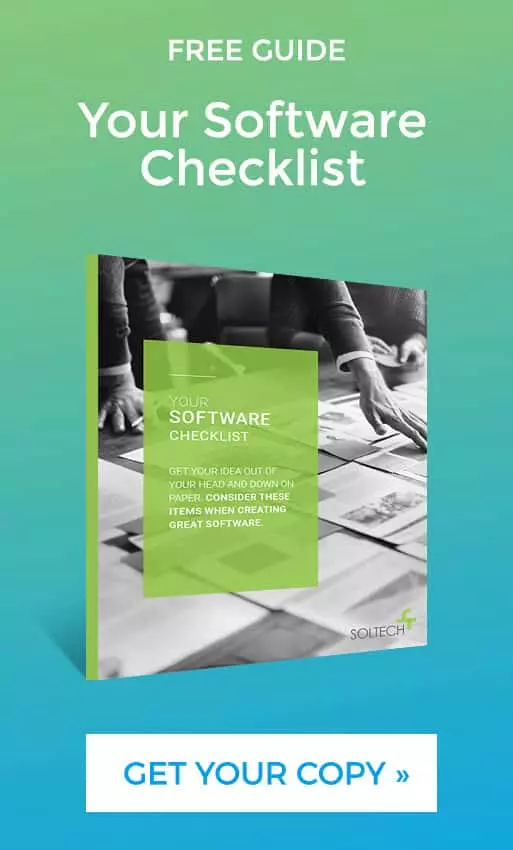
A Review of the Top Software Development Buzzwords
By Thayer Tate
At SOLTECH, we meet with many clients and discuss numerous projects. While several of the clients we interact with come from a technical background, we know not everyone is familiar with the lingo used within the software development industry. To help you better understand the software development buzzwords used in say, a consultation, we’ve defined the top keywords below.
Software Development Buzzwords
UX vs. UI
Firstly, UX means User Experience and UI means User Interface. They work hand-in-hand but are two very separate things. UX is the layout and navigation elements of a website which is done from the user’s perspective. UI is the design aspect of things, the look and feel of the application.
Cookies and Cache
Unfortunately, these aren’t the same cookies you are probably imagining. “Cookies are messages that web servers pass to your web browser when you visit a website. Your browser stores each message in a small file called cookie.txt . When you request another page from the server, your browser sends the cookie back to the server.” In technology, cache is the component that stores data so future requests for that data can be served faster; the data stored in a cache might be the result of an earlier computation or the duplicate of data stored elsewhere.
CMS and SEO
CMS stands for Content Management System and SEO stands for Search Engine Optimization. A CMS is used to manage content – think WordPress – and is especially useful when your site will be content heavy through the use of blogging. SEO is how your website will rank in search engines. There are specific things you can do to make our site appear on the first page of Google like including H1 and H2 tags in your posts.
Mobile App vs. Web App vs. Mobile Responsive
A mobile application is created specifically for the use on a mobile device. More often than not, this app will look different than the website and not all features will be the same. You cannot use a mobile application on a laptop or desktop. A web application is an application that works in your web browser on your computer. You can also view it on your mobile or tablet device, but it may not load the same way it does on a desktop. That’s because it is not developed to be mobile-responsive. Mobile responsiveness is when the web application can be viewed similarly from web to mobile devices.
Cloud
The cloud is a network of servers, and each server has a different function. Cloud computing means storing and accessing data and programs over the Internet instead of your computer’s hard drive. The cloud is actually a metaphor for the Internet. You can obtain cloud services from a variety of different companies, with Amazon Web Services being one of the most popular.
IoT
IoT stands for Internet of Things. “It is the interconnection via the Internet of computing devices embedded in everyday objects, enabling them to send and receive data.” This can be any device that can be connected to the Internet, such smart thermostats like the Nest.
Thayer Tate
Chief Technology Officer Thayer is the Chief Technology Officer at SOLTECH, bringing over 20 years of experience in technology and consulting to his role. Throughout his career, Thayer has focused on successfully implementing and delivering projects of all sizes. He began his journey in the technology industry with renowned consulting firms like PricewaterhouseCoopers and IBM, where he gained valuable insights into handling complex challenges faced by large enterprises and developed detailed implementation methodologies.
Thayer is the Chief Technology Officer at SOLTECH, bringing over 20 years of experience in technology and consulting to his role. Throughout his career, Thayer has focused on successfully implementing and delivering projects of all sizes. He began his journey in the technology industry with renowned consulting firms like PricewaterhouseCoopers and IBM, where he gained valuable insights into handling complex challenges faced by large enterprises and developed detailed implementation methodologies.
Thayer’s expertise expanded as he obtained his Project Management Professional (PMP) certification and joined SOLTECH, an Atlanta-based technology firm specializing in custom software development, Technology Consulting and IT staffing. During his tenure at SOLTECH, Thayer honed his skills by managing the design and development of numerous projects, eventually assuming executive responsibility for leading the technical direction of SOLTECH’s software solutions.
As a thought leader and industry expert, Thayer writes articles on technology strategy and planning, software development, project implementation, and technology integration. Thayer’s aim is to empower readers with practical insights and actionable advice based on his extensive experience.




